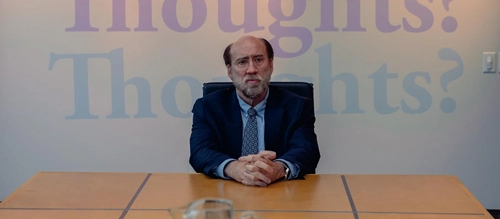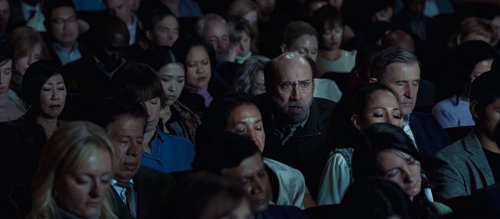Dream Scenario (2023) Review

Dream Scenario (2023)
Director: Kristoffer Borgli
Screenwriter: Kristoffer Borgli
Starring: Nicolas Cage, Julianne Nicholson, Michael Cera, Dylan Baker, Tim Meadows, Lily Bird, Jessica Clement, Paula Boudreau, Marie McPhail
Nicolas Cage has become an internet darling in recent times, to the point that he’s the first actor since John Malkovich who has been able to comfortably play himself in a film without it seeming self-indulgent. Matt Damon and Ben Affleck turning up for a small cameo in Jay and Silent Bob Strike Back might qualify for a special dispensation, however. The thing with Nicolas Cage that makes him unique, though, is that he is one of very few actors who pops up in anything and everything. He can just as easily carry a huge budget blockbuster as he’s likely to be the face of a straight-to-streaming B-Movie. What we can always guarantee is that he’ll always give it his absolute best. Whether that means creating a new meme or garnering widespread critical acclaim doesn’t really matter, because either way we’re in for something special.
To that end, Dream Scenario seems like, well, a dream scenario for a Nicolas Cage film. At its base, it’s about an unremarkable professor, played by Cage, who wants more from his life, and suddenly finds notoriety when he starts popping up in people’s dreams. As a premise, it’s weird and compelling, but it also comes with the backing of A24 – a studio who have built a certain level of trust among audiences with films like Everything Everywhere All at Once and Past Lives in recent memory. It sounds like a B-Movie fit to garner the internet’s next favourite meme, but it’s backed by a studio that could give us Cage’s next Academy Award for Best Actor.
Paul (Nicholas Cage) is instantly quite relatable as a character – he lives a normal life with a normal job and a normal family. It’s comfortable, but it isn’t anything exciting. We get a glimpse into the kind of person he is when he sets up a meeting with a former colleague, Sheila (Paula Boudreau). Sheila is about to have a piece of research published that Paul believes he should be credited for. Whether he actually should or not is never confirmed, but Sheila certainly doesn’t agree with him.
As we get to know Paul more, it’s quite easy to believe it might well have been a reach on his behalf in an attempt to gain any kind of recognition in the field he has been working in for his entire life. Paul’s wife, Janet (Julianne Nicholson), encourages Paul to record the meeting so she can hear her husband demand what he’s owed, but he deletes the recording before she’s able to hear the truth of what actually happened.
Paul and Janet go to the theatre together where an ex-girlfriend, Claire (Marnie McPhail), recognises Paul. She’s excited to see him because he has been on her mind lately, albeit unwillingly. He has been appearing in her dreams. He then learns that he has been appearing in his students’ dreams too, and then also the dreams of a bunch of random people who are asking who he is and why it’s happening on Facebook.

Initially, he’s besotted by the limelight, and he actively takes his space in it. People are excited to meet him for what appears to be the first time in his life and he can’t get enough of it. He even derails whole lectures to engage in a Q&A sessions with students who are seeing him in their dreams. What he isn’t so happy about is that, like in real life, he always seems to play a passive part in the dreams. As he starts to play a much more active role in his own life, the version of him that appears in people’s dreams follows suit, but it isn’t to a desirable end.
Dream Scenario is far less weird than it seems. Much like Being John Malkovich, it uses its surrealist nucleus as a driver to explore much more usual themes. Through this odd phenomenon where Nicolas Cage’s Paul is appearing in everyone’s dreams, we’re asked to consider cultural phenomena that are relevant to modern life. The newly instantaneous and unfiltered nature of how a person can rise to fame, the loss of nuance that comes with the sudden mass awareness of a flawed individual, and the frivolity of cancel culture are all brought into question.
There isn’t really anything in Dream Scenario that absolutely has to be driven by the idea that this random person has started showing up in people’s dreams, though, nor is there any attempt to explore how or why it might be happening. If Paul had just gone viral as the result of pulling a strange face in the background of a news report, for example, most of Dream Scenario would be exactly the same film.
The story of Paul’s rise and fall could still be the same for the large majority of it, and in a way, it might have even been more satisfying as a complete narrative. There wouldn’t have been any abstract concept to dive further into when there was clearly no interest in doing so. The interest of the film is plainly in deconstructing and commenting on modern viral celebrity culture and the pitfalls that come with it.
Dream Scenario is a showcase of what Nicholas Cage does very well, or at least one of the things he does very well. It’s a character study of a man who’s frustrated with a life that most people would be satisfied with because he wants more from it. It’s as if Charlie Kaufman’s Adaptation was rewritten to replace the references to orchids with an allegory about a mild-mannered Freddy Krueger, and who else could play such a role? It’s effortlessly watchable and compelling in a number of ways, but it wouldn’t have hurt to further explore the absurd concept that it all comes from.
Score: 19/24
Written by Rob Jones
You can support Rob Jones on his website: rbrtjones.com
Twitter: @rbrtjones

